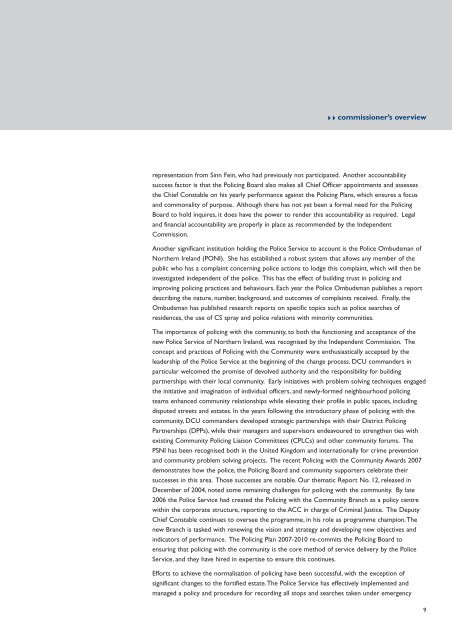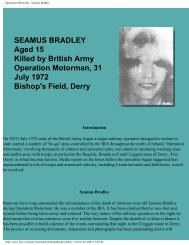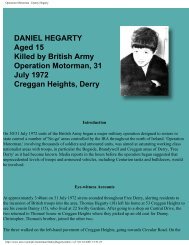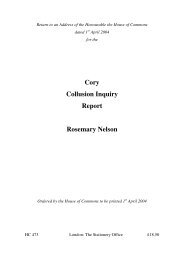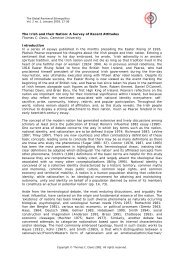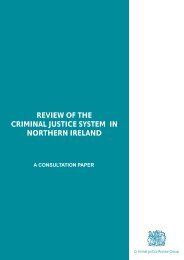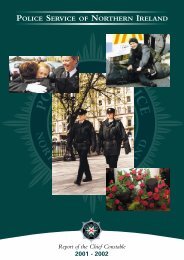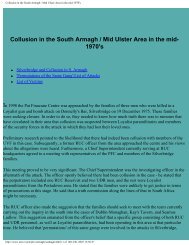11293 report 19 - CAIN - University of Ulster
11293 report 19 - CAIN - University of Ulster
11293 report 19 - CAIN - University of Ulster
You also want an ePaper? Increase the reach of your titles
YUMPU automatically turns print PDFs into web optimized ePapers that Google loves.
policing commissioner’s with the community overviewrepresentation from Sinn Fein, who had previously not participated. Another accountabilitysuccess factor is that the Policing Board also makes all Chief Officer appointments and assessesthe Chief Constable on his yearly performance against the Policing Plans, which ensures a focusand commonality <strong>of</strong> purpose. Although there has not yet been a formal need for the PolicingBoard to hold inquires, it does have the power to render this accountability as required. Legaland financial accountability are properly in place as recommended by the IndependentCommission.Another significant institution holding the Police Service to account is the Police Ombudsman <strong>of</strong>Northern Ireland (PONI). She has established a robust system that allows any member <strong>of</strong> thepublic who has a complaint concerning police actions to lodge this complaint, which will then beinvestigated independent <strong>of</strong> the police. This has the effect <strong>of</strong> building trust in policing andimproving policing practices and behaviours. Each year the Police Ombudsman publishes a <strong>report</strong>describing the nature, number, background, and outcomes <strong>of</strong> complaints received. Finally, theOmbudsman has published research <strong>report</strong>s on specific topics such as police searches <strong>of</strong>residences, the use <strong>of</strong> CS spray and police relations with minority communities.The importance <strong>of</strong> policing with the community, to both the functioning and acceptance <strong>of</strong> thenew Police Service <strong>of</strong> Northern Ireland, was recognised by the Independent Commission. Theconcept and practices <strong>of</strong> Policing with the Community were enthusiastically accepted by theleadership <strong>of</strong> the Police Service at the beginning <strong>of</strong> the change process. DCU commanders inparticular welcomed the promise <strong>of</strong> devolved authority and the responsibility for buildingpartnerships with their local community. Early initiatives with problem solving techniques engagedthe initiative and imagination <strong>of</strong> individual <strong>of</strong>ficers, and newly-formed neighbourhood policingteams enhanced community relationships while elevating their pr<strong>of</strong>ile in public spaces, includingdisputed streets and estates. In the years following the introductory phase <strong>of</strong> policing with thecommunity, DCU commanders developed strategic partnerships with their District PolicingPartnerships (DPPs), while their managers and supervisors endeavoured to strengthen ties withexisting Community Policing Liaison Committees (CPLCs) and other community forums. ThePSNI has been recognised both in the United Kingdom and internationally for crime preventionand community problem solving projects. The recent Policing with the Community Awards 2007demonstrates how the police, the Policing Board and community supporters celebrate theirsuccesses in this area. Those successes are notable. Our thematic Report No. 12, released inDecember <strong>of</strong> 2004, noted some remaining challenges for policing with the community. By late2006 the Police Service had created the Policing with the Community Branch as a policy centrewithin the corporate structure, <strong>report</strong>ing to the ACC in charge <strong>of</strong> Criminal Justice. The DeputyChief Constable continues to oversee the programme, in his role as programme champion.Thenew Branch is tasked with renewing the vision and strategy and developing new objectives andindicators <strong>of</strong> performance. The Policing Plan 2007-2010 re-commits the Policing Board toensuring that policing with the community is the core method <strong>of</strong> service delivery by the PoliceService, and they have hired in expertise to ensure this continues.Efforts to achieve the normalisation <strong>of</strong> policing have been successful, with the exception <strong>of</strong>significant changes to the fortified estate.The Police Service has effectively implemented andmanaged a policy and procedure for recording all stops and searches taken under emergency9


